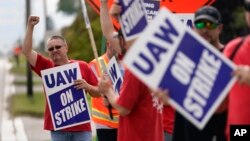The United Auto Workers union expanded strikes against Detroit automakers Friday, ordering 7,000 more workers to walk off the job in Illinois and Michigan to put more pressure on the companies to improve their offers.
It was the second time the union has widened the walkouts, which started two weeks ago at three assembly plants before the most recent addition of a Ford plant in Chicago and a General Motors factory near Lansing.
Union President Shawn Fain told workers in a video appearance that the strikes were escalated because Ford and GM refused "to make meaningful progress" in contract talks. Jeep maker Stellantis was spared from the third round of strikes.
Ford and GM shot back as a war of words with the union intensified. Ford accused the UAW of holding up a deal mainly over union representation at electric vehicle battery plants, most of which are joint ventures with a Korean manufacturer.
"We still have time to reach an agreement and avert a real disaster," Ford CEO Jim Farley said. The company said the work stoppages are starting to affect fragile companies that make parts for the factories on strike.
GM's manufacturing chief said the union was calling more strikes "just for the headlines, not real progress."
The GM plant in Delta Township, near Lansing, makes large crossover SUVs such as the Chevrolet Traverse and Buick Enclave. A nearby metal parts stamping plant will remain open, Fain said.
The Chicago Ford plant makes the Ford Explorer and Explorer Police Interceptors, as well as the Lincoln Aviator SUV.
Fain said union bargainers are still talking to the companies, and he was hopeful they could reach deals.
Stellantis, he said, made significant progress Friday by agreeing to unspecified cost-of-living raises, the right not to cross a picket line and the right to strike over plant closures.
Raneal Edwards, a longtime GM employee who works at the Lansing-area factory, said she was "shocked but happy" to hear that her plant would join the strike.
In a note to workers Friday, Edwards' boss, GM manufacturing chief Gerald Johnson, said the company has yet to receive a counteroffer from union leaders to a Sept. 21 economic proposal.
Automakers have long said they are willing to give raises, but they fear that a costly contract will make their vehicles more expensive than those built at nonunion U.S. plants run by foreign corporations.
Ford's Farley accused the union of holding an agreement hostage over union representation of battery plant workers. On a conference call with industry analysts, he said high wages at battery plants would raise the price of Ford's electric vehicles above those from Tesla and other competitors.
"Record contract? No problem. Mortgaging our future? That's a big problem. We will never do it," Farley said.
Ford's battery plants, Farley said, have not been built. "They have not been organized by the UAW yet because the workers haven't been hired and won't be for many years to come," he said.
Fain later accused Farley of lying and said the union gave Ford a counteroffer Monday but has not heard back. He stressed that there is no impasse, although they're far apart on economic issues such as defined-benefit pensions for all workers and health insurance for retirees.
"We've had good discussions. There's times we think we're getting somewhere, and then things just stop. And it's not just Ford, it's all the Big Three, and you can pick an issue," he said. Fain also said "job security in the EV transition" remains an issue.
The union insists that labor expenses are only 4% to 5% of the cost of a vehicle, and that the companies are making billions in profits and can afford big raises.
The electric vehicle battery plants are a huge issue for the union's future. Some industry executives, including Farley, say building EVs will take up to 40% fewer workers because they have fewer parts. So the union is looking to organize battery plants and win top wages so displaced workers have somewhere to go, especially those making combustion engines.
Other industry officials, including GM CEO Mary Barra, say there will be enough jobs for all as the industry moves away from gasoline vehicles.
The automakers' last known wage offers were around 20% over the life of a four-year contract, a little more than half of what the union has demanded. Other contract improvements, such as cost of living increases, restoration of defined-benefit pensions for newly hired workers and an end to wage tiers within the union are also on the table.





